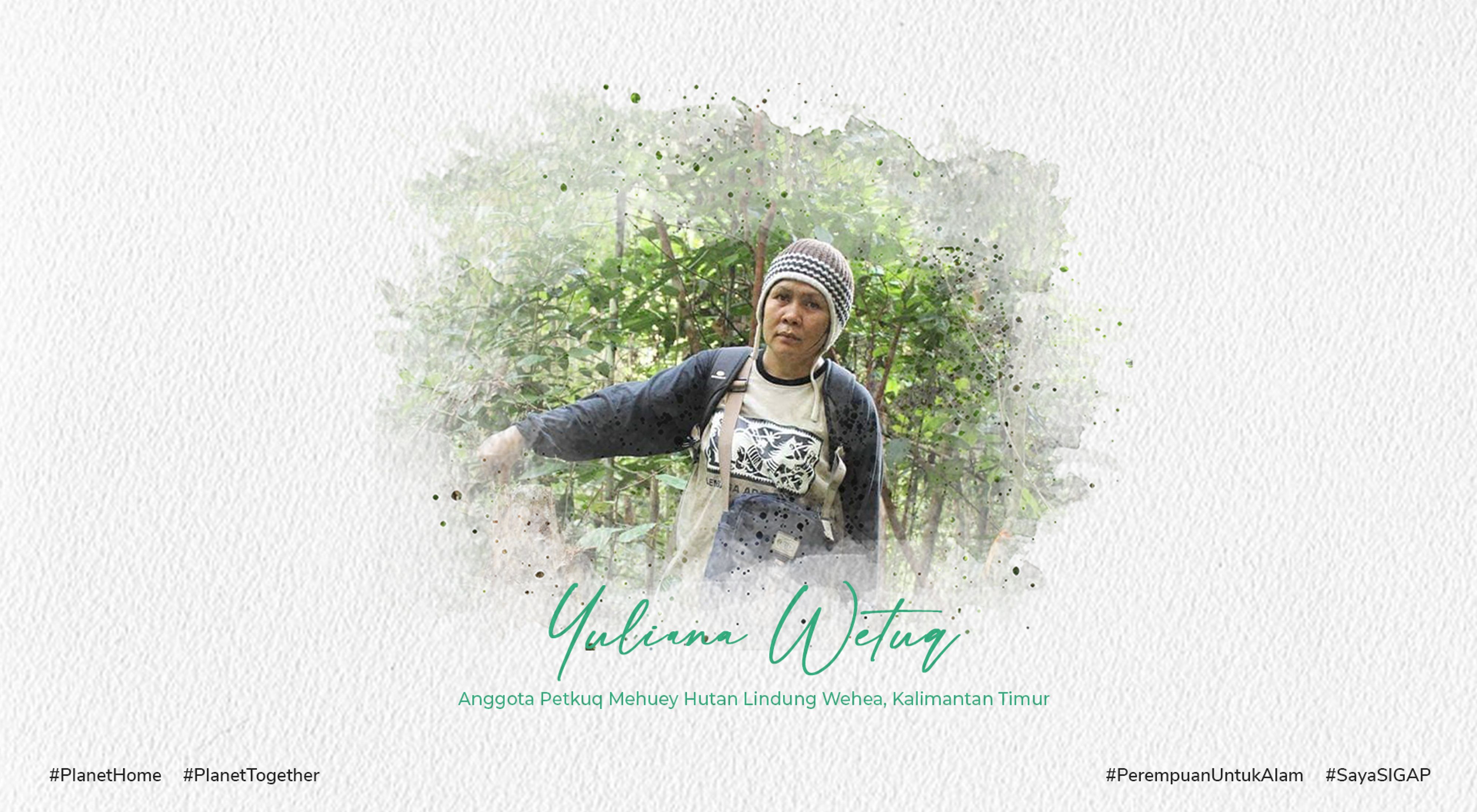Quote: Yuliana Wetuq
Forest is the source of our life, Wehea people
Guardian and protector. Two words that closely define Yuliana Wetuq. This 45-years-old woman from Nehas Liah Bing Village, Muara Wahau District, East Kutai Regency, East Kalimantan, is one of the driving forces of Dayak Wehea Customary Institution (Lembaga Adat Dayak Wehea). This single mother of four is actively involved in coordinating the Wehea Protected Forest patrol group, known as Petkuq Mehuey.

In the Dayak language, Petkuq Mehuey means “the forest guardian group.” This group consists of several Nehas Liah Bing Village’s Dayak Wehea youths officiated by the Kepala Adat (customary head) of the Dayak Wehea tribe to protect the Wehea Protected Forest area. They patrol forest to prevent illegal logging, collect flora and fauna data, and monitor wildlife. Additionally, Petkuq Mehuey also escorts visitors and ensures the conservation of Wehea Protected Forest. In doing their job, this group will take turns living inside the forest for three months.
Petkuq Mehuey is on the front line to ensure Wehea Protected Forest’s conservation and preserve their culture and legacies. Yuliana is one of the villagers who dedicated herself to Wehea Protected Forest. She is one of three women active in Petkuq Mehuey’s activities and holds a vital role in the group’s operations. Her tasks are to coordinate the patrol team’s schedule for staying in the forest, ensure the logistics and needs of the group in the forest, and organize forest visiting hours for visitors and tourists.


The Wehea Protected Forest is an important asset in biodiversity conservation. This area of 29,000 hectares is the home to endemic wildlife such as orangutan (Pongo pygmaeus), eastern grey gibbon (Hylobates funereu), maroon leaf monkey (Presbytis rubicunda), and clouded leopard (Neofelis diardi borneensis). Unfortunately, 80% of protected wildlife habitats are outside of conservation areas. Furthermore, this forest’s abundant natural resources are utilized by the local community and residents as food sources, water sources, medicinal herbs, and many more.
The high value of the Wehea Protected Forest for the sustainability of the biodiversity and the community’s livelihood compels the customary (adat) community to not only utilize forest resources for production purposes. Furthermore, this forest’s abundant natural resources are utilized by the local community and residents as food sources, water sources, medicinal herbs, and many more. Yayasan Konservasi Alam Nusantara (YKAN), with the Dayak Wehea community and East Kutai Regency Government, committed to protecting this Bornean orangutan habitat by proposing the conversion of what was once a production forest into a protected forest managed by Dayak Wehea community. Eventually, in 2004, this forest’s status changed into a protected forest area along with management rights by Dayak Wehea indigenous people.
“Forest is the source of our life, Wehea people. Before looking for medical assistance, the Dayak Wehea community usually depends on the medicinal herbs in the forest first,” explained Yuliana.

She is a mother, a part of the indigenous community, and one of the forest guardians. Yuliana hoped that her roles could inspire other women and girls of Wehea to be involved in conserving Wehea customs (adat) and nature. “Protect the existing biodiversity in our forest so it would be conserved and not extinct. Keep this spirit alive,” she said. Yuliana hoped that by protecting the forest, Wehea’s future generation would be protected and prosper. “Hopefully, this forest will stay conserved until our great-grandchildren’s time,” she said.
Protecting the forest area, for the Wehea community, not only ensures the preservation of nature, but also the preservation of their culture. If the forest around Wehea is lost, the traditions and ceremonies of the Wehea Tribe will be extinct. It is the hope that Yuliana also believes in protecting the forest so that Wehea's future generations will be awake and prosperous. "Hopefully this forest will be preserved for our children and grandchildren," he concluded.


